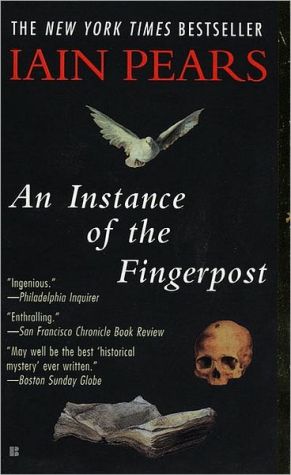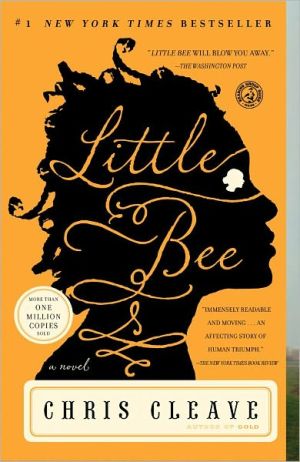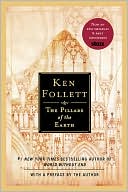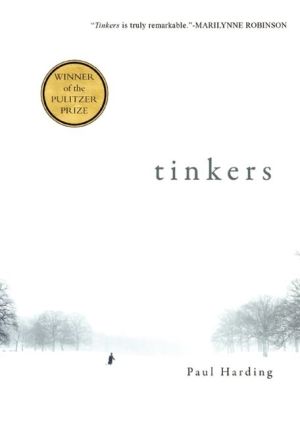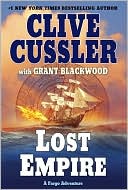An Instance of the Fingerpost
In 1663 Oxford, a servant girl confesses to a murder. But four witnesses—a medical student, the son of a traitor, a cryptographer, and an archivist—each finger a different culprit...
Search in google:
We are in Oxford in the 1660s - a time, and place, of great intellectual, scientific, religious and political ferment. Robert Grove, a fellow of New College is found dead in suspicious circumstances. A young woman is accused of his murder. We hear about the events surrounding his death from four witnesses: Marco da Cola, a Venetian Catholic intent on claiming credit for the invention of blood transfusion; Jack Prescott, the son of a supposed traitor to the Royalist cause determined to vindicate his father; John Wallis, chief cryptographer to both Cromwell and Charles II, a mathematician, theologican and inveterate plotter; and Anthony Wood, the famous Oxford antiquary. Each witness tells their version of what happened. Only one reveals the extraordinary truth.An Instance of the Fingerpost is a magnificent tour de force: an utterly compelling historical mystery story with a plot that twists and turns and keeps the reader guessing until the very last page.Los Angeles Times Book ReviewFascinating...quite extraordinary...elevates the murder mystery to the category of high art.
A Question of Precedence\ \ \ Marco da Cola, gentleman of Venice, respectfully presents his greetings. I wish to recount the journey which I made to England in the year 1663, the events which I witnessed and the people I met, these being, I hope, of some interest to those concerned with curiosity. Equally, I intend my account to expose the lies told by those whom I once numbered, wrongly, amongst my friends. I do not intend to pen a lengthy self-justification, or tell in detail how I was deceived and cheated out of renown which should rightfully be mine. My recital, I believe, will speak for itself.\ I will leave out much, but nothing of significance. Much of my tour around that country was of interest only to myself, and finds no mention here. Many of those I met, similarly, were of little consequence. Those who in later years did me harm I describe as I knew them then, and I beg any reader to remember that, although I was hardly callow, I was not yet wise in the ways of the world. If my narrative appears simple and foolish, then you must conclude that the young man of so many years past was similarly so. I do not go back to my portrait to add extra layers of tint and varnish to cover my errors or the weakness of my draftsmanship. I will make no accusations, and indulge in no polemic against others; rather, I will say what happened, confident that I need do no more.\ My father, Giovanni da Cola, was a merchant, and for the last years of his life was occupied in the importation of luxury goods into England which, though an unsophisticated country, was nonetheless beginning to rouse itself from the effects of revolution. He had shrewdly recognized from afar that the return of King Charles II meant that vast profits would once again be there for the taking and, stealing a march on more timid traders, he established himself in London to provide the wealthier English with those luxuries which the Puritan zealots had discouraged for so many years. His business prospered: he had a good man in London in Giovanni di Pietro, and also entered into a partnership with an English trader, with whom he split his profit. As he once told me, it was a fair bargain: this John Manston was sly and dishonest, but possessed unrivaled knowledge of English tastes. More importantly, the English had passed a law to stop goods coming into their ports in foreign boats, and Manston was a way through this difficulty. As long as my father had di Pietro in place to keep an eye firmly on the accounts, he believed there was little chance of being cheated.\ He was long past the time when he took a direct interest in his business, having already converted a portion of his capital into land on Terra Firma to prepare for admission to the Golden Book. Although a merchant himself, he intended his children to be gentlemen, and discouraged me from active participation in his business. I mention this as an indication of his goodness: he had noticed early on that I had little mind for trade, and encouraged me to turn my face against the life he led. He also knew that my sister's new husband was more fitted for ventures than I.\ So, while my father secured the family name and fortune, I--my mother being dead and one sister usefully married--was in Padua to acquire the smatterings of polite knowledge; he was content to have his son a member of our nobility but did not wish to have me as ignorant as they. At this point and of mature years--I was now rising thirty--I was suddenly struck by a burning enthusiasm to become a citizen of the Republic of Learning, as it is called. This sudden passion I can no longer recall, so completely has it left me, but then the fascination of the new experimental philosophy held me under its spell. It was, of course, a matter of the spirit rather than of practical application. I say with Beroaldus, non sum medicus, nec medicinae prorsus expers, in the theory of physick I have taken some pains, not with an intent to practice, but to satisfy myself. I had neither desire nor need to gain a living in such a fashion, although occasionally, I confess with shame, I taunted my poor good father by saying that unless he was kind to me, I would take my revenge by becoming a physician.\ I imagine that he knew all along I would do no such thing, and that in reality I was merely captivated by ideas and people which were as exciting as they were dangerous. As a result, he raised no objections when I wrote to him about the reports of one professor who, though nominally charged with lecturing in rhetoric, spent much of his time enlarging upon the latest developments in natural philosophy. This man had traveled widely and maintained that, for all serious students of natural phenomena, the Low Countries and England were no longer to be disdained. After many months in his care, I caught his enthusiasm and, having little to detain me in Padua, requested permission to tour that part of the world. Kind man that he was, my father immediately gave his assent, procured permission for me to leave Venetian territory, and sent a bill of credit to his bankers in Flanders for my use.\ I had thought of taking advantage of my position to go by sea, but decided that, if I was to acquire knowledge, then it would be best to see as much as possible and this was better done in a coach than by spending three weeks in a ship drinking with the crew. I must add that I also suffer abominably from seasickness--which weakness I have always been loath to admit, for although Gomesius says such sickness cures sadness of spirit, I have never found it to be the case. Even so, my courage weakened, then evaporated almost entirely, as the journey progressed. The journey to Leiden took only nine weeks, but the sufferings I endured quite took my mind off the sights I was viewing. Once, stuck in the mud halfway through an Alpine pass, the rain coming down in torrents, one horse sick, myself with a fever and a violent-looking soldier as my only companion, I thought that I would rather suffer the worst gale in the Atlantic than such misery.\ But it would have been as long to go back as to continue, and I was mindful of the scorn in which I would be held if I returned, shamefaced and weak. to my native town. Shame, I do believe, is the most powerful emotion known to man; most discoveries and journeys of importance have been accomplished because of the ignominy that would be the result if the attempt was abandoned. So, sick for the warmth and comfort of my native land--the English have the word nostalgia for this illness, which they believe is due to the imbalance caused by an unfamiliar environment--I continued on my way, ill-tempered and miserable, until I reached Leiden, where I attended the school of medicine as a gentleman.\ So much has been written about this seat of learning, and it has so little to do with my recital, that it suffices to say that I found and profited greatly from two professors of singular ability who lectured on anatomy and bodily economy. I also traveled throughout the Low Countries and fell into good company, much of which was English and from whom I learnt something of the language. I left for the simple reason that my kind good father ordered me so to do and for no other reason. There was some disarray in the London office, a letter told me, and he needed family to intervene: no one else could be trusted. Although I had little practical knowledge of trade, I was glad to be the obedient son, and so discharged my servant, organized my affairs and shipped from Antwerp to investigate. I arrived in London on March 22nd, 1663, with only a few pounds left, the sum I paid to one professor for his teaching having all but exhausted my funds. But I was not concerned, for I thought that all I needed to do was make the short journey from the river to the office maintained by my father's agent, and all would be well. Fool that I was. I could not find di Pietro, and that wretched man John Manston would not even receive me. He is now long since dead; I pray for his soul, and hope the good Lord disregards my entreaties on his behalf, knowing as I do that the longer he suffers fiery torment, the more just his punishment will be.\ I had to beg a mere servant for information, and this lad told me that my father's agent had died suddenly some weeks previously. Even worse, Manston had swiftly moved to take all the fortune and business for his own, and refused to admit that any had belonged to my father. Before lawyers he had produced documents (naturally, forged) to prove this assertion. He had, in other words, entirely defrauded my family of our money--that part of it which was in England, at least.\ This boy was, unfortunately, at a loss about how I should proceed. I could lay a complaint before a magistrate, but with no evidence except my own convictions this seemed fruitless. I could also consult a lawyer but, if England and Venice differ in many ways, they are alike in one, which is that lawyers have an insatiable love of money, and that was a commodity I did not possess in sufficient quantity.\ It also rapidly became clear that London was not a healthy place. I do not mean the famous plague, which had not yet afflicted the city; I mean that Manston, that very evening, sent round hired hands to demonstrate that my life would be more secure elsewhere. Fortunately, they did not kill me; indeed, I acquitted myself well in the brawl thanks to the fees my father had paid to my fencing master, and I believe at least one bravo left the field in a worse state than I. But I took the warning nonetheless and decided to stay out of the way until my course was clearer. I will mention little more of this matter except to say that eventually I abandoned the quest for recompense, and my father decided that the costs involved were not worth the money lost. The matter was reluctantly forgotten for two years, when we heard that one of Manston's boats had put into Trieste to sit out a storm. My family moved to have it seized--Venetian justice being as favorable to Venetians as English law is to Englishmen--and the hull and cargo provided some compensation for our losses.\ To have had my father's permission to leave instantly would have raised my spirits immeasurably, for the weather in London was enough to reduce the strongest man to the most wretched despair. The fog, the incessant, debilitating drizzle, and the dull bitter cold as the wind swept through my thin cloak reduced me to the lowest state of despondency. Only duty to my family forced me to continue rather than going to the docks and begging for a passage back home. Instead of taking this sensible course, however, I wrote to my father informing him of developments and promising to do what I could, but pointed out that until I was rearmed from his coffers there was little I might practically accomplish. I had, I realized, many weeks to fill in before he could respond. And about five pounds to survive on.\ The professor under whom I had studied in Leiden had most kindly given me letters to gentlemen with whom he had corresponded, and, these being my only contacts with Englishmen, I decided that my best course would be to throw myself on their mercy. An additional attraction was that neither was in London, so I picked the man who lived in Oxford, that being the closest, and decided to leave as swiftly as possible.\ The English seem to have strong suspicion of people moving around, and go out of their way to make travel as difficult as possible. According to the piece of paper pasted up where I waited for the coach, the sixty-mile trip to Oxford would take eighteen hours--God Willing, as it added piously. The Almighty, alas, was not willing that day; rain had made much of the road disappear, so the coachman had to navigate his way through what seemed very like a plowed field. A wheel came off a few hours later, tipping my chest on the ground and damaging the lid and, just outside a mean little town called Thame, one of the horses broke a leg and had to be dispatched. Add to that the frequent stops at almost every inn in southern England (the innkeepers bribe the drivers to halt) and the journey took a total of twenty-five hours, with myself ejected into the courtyard of an inn in the main street of the city of Oxford at seven o'clock in the morning.
\ Andrew MillerA near-perfect example of the genre. -- The New York Times Book Review\ \ \ \ \ Daniel ReitzRiverhead is marketing the hell out of historian Iain Pears' first novel, An Instance of the Fingerpost, and the media seems turned on by the hype -- you'd almost believe this was "the literary thriller of the year." Don't be surprised if midway through this sprawling and seemingly endless tome, however, you feel like suing the publishers (and certain critics) for fraud. If this book is a thriller, then I'm Edgar Allan Poe. \ For Pears and certain other moderately talented writers, history provides a sturdy hook to hang a shabby coat upon. It gives a sense of legitimacy -- even intellectual clout -- to writers such as Caleb Carr, whose novels are trotted out with Umberto Eco-ish pretensions. (In Carr's case, it's the jacket designer and the marketers who are the real artists, gulling readers into thinking it must be literature because Theodore Roosevelt figures as a character, there's an Alfred Stieglitz photograph on the cover and it's over 400 pages long.) Pears, as it happens, is no Caleb Carr. He's much more boring than that.\ An Instance of the Fingerpost is a Rashomon-like tale that deconstructs a murder in 1660s Oxford and the trial that leads a young woman to be hanged for a crime she didn't commit. (Or did she?) Every section is narrated by a different character -- although each tends to sound much the same as those that came before -- and each narrator reevaluates the version of events you've just read, giving his spin on what is true, each assuring you that he alone is telling you the truth. The problem is that you're getting multiple versions of a story that Pears hasn't convinced you to care about in the first place. The narrators are a motley collection of pompous gasbags, and Pears' approach is to present each rambling section as if we've just stumbled on some actual 16th century historical documents -- every word is supposedly both fascinating and important.\ Pears may be a better writer than Carr, but he's sanctimonious where Carr tends to be overly manipulative. The point of his novel seems best summed up when one of the ponderous speakers tells us, "We are all capable of the most monstrous evil when convinced we are right, and it was an age when the madness of conviction held all tightly in its grasp." This is a noble sentiment, to be sure, but after a century of Stalin, Hitler and Mao, it's not particularly revelatory. And when a book is as long as this one (691 pages) and the "thriller" hook is this uncompelling, you might find yourself losing patience faster than you can say The Name of the Rose. -- Salon\ \ \ \ First Things MagazineA historical mystery novel of very considerable philosophical, even theological, interest.... A first rate instance of this genre.\ \ \ \ \ Los Angeles Times Book ReviewFascinating...quite extraordinary...elevates the murder mystery to the category of high art.\ \ \ \ \ New York Times Book ReviewSuccessful literary thrillers in the mold of Umberto Eco's The Name of the Rose are the stuff of a publisher's dreams, and in Pears' novel they may have found a near-perfect example of the genre...Pears, with a painstaking, almost forensic attention to detail, constructs his world like a master painter...\ \ \ \ \ New YorkerRichly imagined.\ \ \ \ \ NewsweekA whopping good read.\ \ \ \ \ NewsweekBrings not merely a huge cast of characters but a whole century vividly to life.\ \ \ \ \ PeopleIt is 1663, and England is wracked with intrigue and civil strife. When an Oxford don is murdered, it seems at first that the incident can have nothing to do with great matters of church and state....Yet, little is as it seems in this gripping novel, which dramatizes the ways in which witnesses can see the same events yet remember them falsely. Each of four narrators-a Venetian medical student, a young man intent on proving his late father innocent of treason, a cryptographer, and an archivist-fingers a different culprit...an erudite and entertaining tour de force.People\ \ \ \ \ People MagazineGripping...an entertaining tour de force.\ \ \ \ \ San Francisco Chronicle Book ReviewEnthralling.\ \ \ \ \ Sunday Boston GlobeNow in trade, the New York Times bestseller that "may well be the best 'historical mystery' ever written.\ \ \ \ \ The Philadelphia InquirerIngenious.\ \ \ \ \ Publishers WeeklyThis massive, delightfully titled literary thriller (it's a quote from Sir Francis Bacon) is the kind of gamble it's great to see a publisher taking in these often timid times. The English author, responsible so far for a series of conventional mysteries, has gone back to 17th-century Oxford for an absorbing, macabre tale of murder, politics, faith and betrayal. Featured in more than incidental roles are such real-life characters as John Locke, Sir Christopher Wren, Robert Boyle, King Charles II and the Earl of Clarendon. The murder by poisoning of Robert Grove, a Fellow of New College, and the subsequent trial and execution for the crime of Sarah Blundy, daughter of a freethinking early Socialist and anti-Royalist, is the heart of the action, which is related in four separate first-person accounts, each the length of a short novel. There is Marco da Cola, a good-hearted Venetian visitor whose irritable reflections on the English are witty and betray a perfect period ear; Jack Prestcott, a fiery young lawyer devoted to proving that his father, disgraced as a traitor, was himself betrayed; John Wallis, priest, mathematician and cryptographer of genius (also a real character), whose coldly cynical schemes set off a series of dazzlingly complex political maneuvers; and bookish scholar Anthony Wood, a background figure to the rest, but whose consuming love for Sarah makes him ultimately the central actor in the drama. Pears' grasp of the thought of the time, with its scientific zeal curbed always by what seems now like excess religiosity, its ferocious plotting and counterplotting, its struggles for power and position, is sure. Though there are many digressions, most are fascinating, and the book boasts an overall narrative momentum that carries even an ill-informed contemporary reader along.\ \ \ \ \ Library JournalEngland of the 1660s was full of political and intellectual turmoil, speculation, and experimentation, not to mention a cast of colorful and controversial characters. It is firmly within this maelstrom that Pears (The Last Judgment) has set this massive historical whodunit. A fellow of New College, Oxford, is found dead of arsenic poisoning (from a fancy carafe of brandy), and a young woman of the evening is accused, sentenced, and hanged for his murder. Case seemingly closed. But no, four very different versions of what really happened to the late Professor Grange related by four eyewitnesses to the crime weave a convoluted fabric of religious, scientific, and political intrigue. Basing his novel loosely upon an actual case from the period, Pears pits the key minds of the day -- Boyle, Locke, Wren and others against one another as each takes a shot at gaining from the event. Strange bedfellows indeed. Followers of Brother Cadfael and the works of Anne Perry and Umberto Eco will revel in this smartly paced, rather tongue-in-cheek tour de force. -- Susan Gene Clifford, Aerospace Corporation, El Segundo, California\ \ \ \ \ Library JournalEngland of the 1660s was full of political and intellectual turmoil, speculation, and experimentation, not to mention a cast of colorful and controversial characters. It is firmly within this maelstrom that Pears (The Last Judgment) has set this massive historical whodunit. A fellow of New College, Oxford, is found dead of arsenic poisoning (from a fancy carafe of brandy), and a young woman of the evening is accused, sentenced, and hanged for his murder. Case seemingly closed. But no, four very different versions of what really happened to the late Professor Grange related by four eyewitnesses to the crime weave a convoluted fabric of religious, scientific, and political intrigue. Basing his novel loosely upon an actual case from the period, Pears pits the key minds of the day -- Boyle, Locke, Wren and others against one another as each takes a shot at gaining from the event. Strange bedfellows indeed. Followers of Brother Cadfael and the works of Anne Perry and Umberto Eco will revel in this smartly paced, rather tongue-in-cheek tour de force. -- Susan Gene Clifford, Aerospace Corporation, El Segundo, California\ \ \ \ \ Boston GlobeMay well be the best 'historical mystery' ever written.\ \ \ \ \ LA Times Book ReviewFascinating...elevates the murder mystery to the category of high art.\ \ \ \ \ The New YorkerRichly imagined.\ \ \ \ \ Washington Post Book WorldUtterly mesmerizing....Don't miss it.\ \
